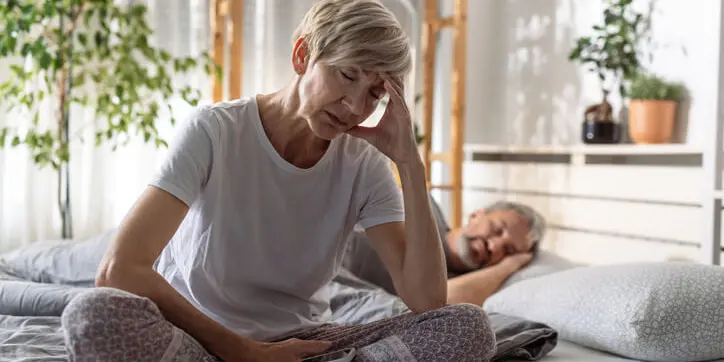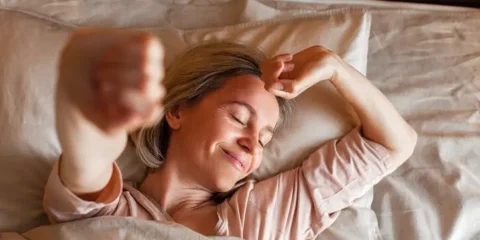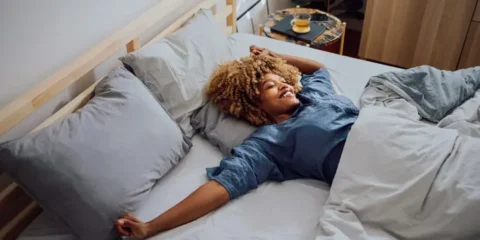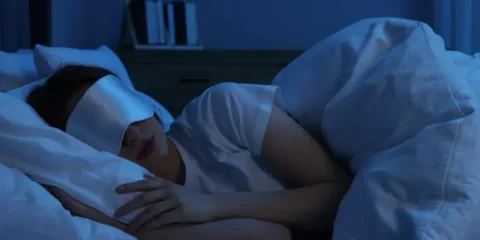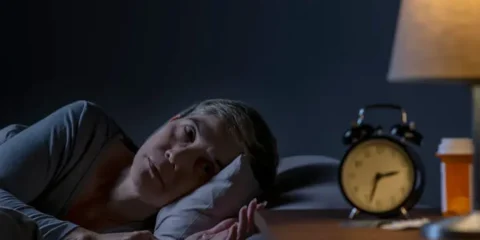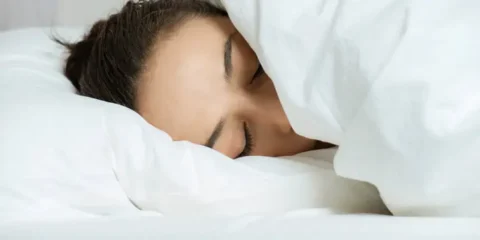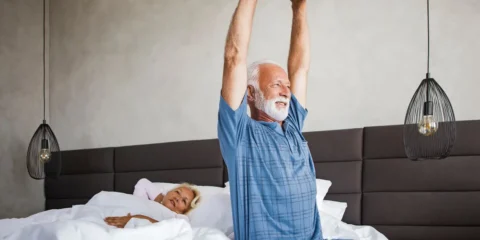At Allure Medical, we understand that anxiety and stress can profoundly impact your sleep.
Racing thoughts and worries at bedtime can prevent you from falling asleep and staying asleep throughout the night. This anxiety sleep disorder involves insomnia and sleep deprivation due to an overactive mind and concerns that are difficult to shut off.
If you struggle to relax and drift off to sleep because your mind won’t stop running, you may be experiencing anxiety sleep disorder.
What is anxiety sleep disorder?
Anxiety sleep disorder involves having trouble sleeping due to excessive rumination and anxiety when you try to sleep. The racing thoughts make it challenging to relax and drift off, leading to insomnia and sleep deprivation.
Anxiety sleep disorder is different from nightmare disorder, which involves frequent disturbing dreams that jolt you awake. With anxiety sleep disorder, you have difficulty initially falling asleep due to a busy mind and anxious thoughts, rather than waking up from bad dreams.
Common Symptoms of Sleep Anxiety
The key symptoms of anxiety sleep disorder include:
- Difficulty falling asleep at bedtime due to a racing mind and worried thoughts
- Tossing and turning through the night, unable to stay asleep
- Waking up frequently during the night and struggling to fall back asleep
- Feeling exhausted upon waking, without feeling rested
- Increased irritability, stress, and impairment during the day due to lack of sleep
- Anticipatory anxiety at bedtime, dreading the struggle to fall asleep
In addition to insomnia, you may experience physical symptoms like:
- Muscle tension
- Headaches
- Gastrointestinal issues
- General agitation
These result from the anxiety and sleep deprivation.
The Interplay of Anxiety and Sleep
Anxiety and sleep share a complex, bidirectional relationship. Not only can anxiety and worrying cause sleep disruption, but lack of sleep can also worsen anxiety.
How Anxiety Affects Sleep Patterns
When you feel anxious, your body goes into fight-or-flight mode, triggering a stress response and release of cortisol and adrenaline. These hormones increase alertness and make it difficult for your body to unwind for sleep.
Continued release of stress hormones at night leads to a hyperaroused state that prevents restful sleep.
Sleep deprivation tends to heighten anxiety levels and emotional reactivity. Lack of sleep decreases your ability to cope with stress and leads to more worried thoughts.
So you end up in a vicious cycle:

Can Anxiety Disorder Lead to Insomnia?
Yes, struggling with an anxiety disorder commonly leads to insomnia. A significant number of adults with anxiety disorders also experience sleep disruption.
Anxiety involves recurrent and excessive worries that are difficult to control. This endless rumination continues at bedtime, making it very challenging to quiet your mind. Those with anxiety disorders often experience “cognitive arousal” at night, with concerns swirling and scenarios playing out.
Insomnia may even be one of the first noticeable symptoms of an anxiety disorder. Seeking treatment for the anxiety itself can help resolve the sleep issues.
Why Panic Attacks Occur at Night
Nocturnal panic attacks often stem from a buildup of anxiety and stress during the day.
Many people experience a spike in anxiety levels at night when they try to sleep:
- Lying in bed with nothing to distract you allows anxious thoughts and worries to flood your mind.
- Hyperarousal and racing thoughts trigger your body’s fight-or-flight response.
- You may experience heart palpitations, shortness of breath, dizziness, and depersonalization as a nighttime panic attack ensues.
This is understandably very frightening, further fueling anxiety about sleep.
Specific Conditions and Sleep Anxiety
Anxiety and Sleep Apnea
Studies show a bidirectional relationship between anxiety and sleep apnea. Sleep apnea involves pauses in breathing during sleep, causing frequent awakenings and poor sleep quality. This sleep disruption can worsen anxiety.
Conversely, people with anxiety disorders have a higher risk of developing sleep apnea. Anxiety’s effects on respiration and sleep architecture may contribute to apneas. Treatment of the sleep apnea often improves anxiety levels.
OCD and Sleep Problems
Yes, sleep difficulties are very common for those with obsessive-compulsive disorder (OCD).
OCD involves upsetting, intrusive thoughts and repetitive rituals. This persistent mental activity continues at bedtime, making it hard to unwind.
Some OCD rituals like excessive hand washing also disrupt sleep routines. OCD treatment can help reduce obsessive thoughts and improve sleep quality.
Hyperthyroidism, Anxiety and Sleep
An overactive thyroid gland (hyperthyroidism) can contribute to anxiety sleep disorder. Excess thyroid hormone increases metabolism, heart rate, and arousal – making it difficult to fall and stay asleep.
Hyperthyroid patients often experience “nocturnal anxiety” with racing thoughts at night along with tremors, sweating, and insomnia.
Addressing the thyroid imbalance through medication helps resolve both the anxiety and sleep disruption.
Anxiety and Sleep in Pregnancy
A lot of expectant mothers experience sleep problems and insomnia. Anxiety and rumination at bedtime is a major contributor.
Pregnancy also increases the risk of conditions like restless leg syndrome and sleep apnea that disrupt sleep.
Prioritizing rest and addressing anxiety through counseling helps prevent insomnia during pregnancy.
The Effects of Sleep Deprivation
Sleep Deprivation and Anxiety
Yes, lack of sleep both magnifies anxiety and increases the risk of developing an anxiety disorder. Even partial sleep deprivation for just one night can significantly raise anxiety levels.
Missing sleep repeatedly activates your body’s stress response, making you feel more on-edge during the day. Loss of sleep also impairs concentration, judgment, and ability to cope with stress. This snowballs into greater worry and emotional reactivity.
Make sleep a priority and practice good sleep habits. Addressing insomnia helps break the cycle of anxiety.
Impact on Anxiety and Depression
Studies demonstrate that poor sleep quality promotes symptoms of both anxiety and depression. Sleep deprivation raises levels of cortisol and inflammatory markers that influence mood regulation.
Without restorative sleep, your brain cannot properly regulate emotional responses. Plus, fatigue from lost sleep makes daily stressors seem more overwhelming.
This combination of biological and emotional effects increases vulnerability to anxiety disorders and depression.
Coping with Anxiety Sleep Disorder
Managing Anxiety
Practicing relaxation techniques is key to quieting your mind at night. When anxious thoughts arise, take deep breaths and mentally scan your body to release tension.
Avoid screens before bed, and establish a calming pre-bed routine. Physical activity reduces anxiety – just avoid vigorous exercise close to bedtime.
Keep a pen and pad by your bed to jot down any worrying thoughts for later instead of ruminating all night. Set boundaries and minimize obligations before bed.
Treatment Options
- Cognitive-behavioral therapy (CBT) helps change thought patterns that fuel anxiety and insomnia.
- We may suggest short-term use of anxiety medication or sleep aids to provide initial relief while implementing long-term strategies.
- For long-term management, we recommend safer options like hydroxyzine, buspirone, or mirtazapine to reduce anxiety while allowing sleep.
- Relaxation techniques like meditation, yoga, massage, and aromatherapy can also calm the mind. We teach these methods to our patients.
- Ensure proper sleep hygiene. Consider consulting our sleep specialists for help creating an effective sleep routine.
NightLase® for Anxiety Sleep Disorder
We at Allure Medical also offer advanced treatments like NightLase®, which uses laser therapy to improve sleep quality.
NightLase® laser therapy is a promising treatment option for those struggling with anxiety sleep disorder. NightLase® uses laser energy to tighten tissues in the throat, opening the airway. Studies show this can increase restful REM sleep and improve sleep quality.
Getting deeper and more restorative sleep helps reduce anxiety levels and emotional reactivity. By treating sleep apnea and improving sleep architecture, NightLase® helps break the vicious cycle between anxiety and insomnia. More refreshing sleep leads to feeling calmer and less on-edge during the day.
NightLase® is non-invasive, with no recovery time needed. Patients report improved sleep after just the first 15-minute session. When combined with anxiety management techniques, NightLase® therapy can provide lasting relief for anxiety sleep disorders.
With Allure Medical’s compassionate care, you can overcome anxiety and finally get restful sleep.


